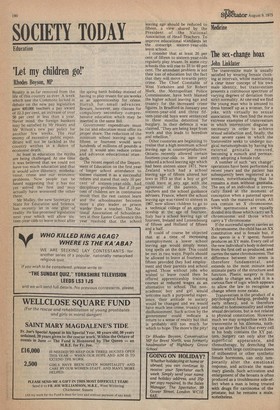Education
'Let my children go!'
Rhodes Boyson, MP
Reality is as far removed from the life of this country as ever. A week which saw the Commons locked in debate on the new pay legislation gave 400,000 teachers a pay award of 22.3 per cent, an increase of over 50 per cent in less than a year. Never mind, the foreign bankers may be satisfied by Mr Healey and Mr Wilson's new pay policy for another few weeks. The real enemy of excessive public expenditure will not be tackled as the country writhes in a dance of economic death.
At least in education the myths are being challenged. At one time it was believed that we could not have too much education and that it would solve illiteracy, misbehaviour, crime and our economic problems. Now people can be heard suggesting that it has not yet solved the first and may actually have worsened the other three.
Mr Mulley, the new Secretary of State for Education and Science, has recently let in one glint of reality. He has promised legislation next year which will allow sixteen-year-olds to leave school after the spring bank holiday instead of having to play truant for six weeks as an apprenticeship for crime. Hurrah for small advances. Beware, however, any clauses for compulsory secondary comprehensive education which may be inserted in the same Bill.
Government expenditure must be cut and education must offer its proper share. The reduction of the minimum school leaving age to fifteen or fourteen would save hundreds of millions of pounds a year. It would also reduce crime and advance educational standards.
The recent report of the Department of Education on the first year of longer school attendance to sixteen claimed it as a successful reform and stated that only 10 per cent of sixteen-year-olds had disciplinary problems. But if 10 per cent of children are in continuous revolt then the rest cannot learn and the schoolmaster becomes more a play leader or prison warder than a teacher. The National Association of Schoolmasters at their Easter Conference this year resolved that the school leaving age should be reduced to fifteen, a view shared by the President of the National Association of Head Teachers. To improve educational standards let the conscript sixteen-year-olds leave school.
I consider that at least 20 per cent of fifteen to sixteen-year-olds regularly play truant. In some city schools this will rise to 33 to 40 per cent. The attendant problem is not their loss of education but the fact that they will move towards petty crime. The Chief Constable of West Yorkshire and Sir Robert Mark, the Metropolitan Police Commissioner, have both blamed the higher school leaving age and truancy for the increased crime figures. In Bradford in January one sixteen-year-old and three fifteen-year-old boys were sentenced to three months detention for burglary. In their defence it was claimed, "They are being kept from work and this leads to boredom and rebellion."
Other countries are beginning to realise that a high minimum school leaving age is counterproductive. Ontario recently allowed certain fourteen-year-olds to leave and reduced a school leaving age which had been sixteen since 1871. New Zealand which had a school leaving age of fifteen altered her laws in 1973 so that a boy or girl could leave at any age with the agreement of the parents, the teachers and the school guidance advisers. France, where the school leaving age was raised to sixteen in 1967, now allows children to go to a technical college of an apprenticeship at the age of fourteen. Italy has a school leaving age of fourteen, Ireland and Luxembourg of fifteen and Holland of fifteen and a half.
It could of course be objected that at a time of increasing unemployment a lower school leaving age would simply mean long spells on the dole. This could be met in two ways. Pupils should be allowed to leave at fourteen or fifteen provided they had employment and their parents and school agreed. Those without jobs who wished to leave could then be offered apprenticeship training courses at reduced wages as an alternative to school. The nonacademic boy and girl would welcome such a purposeful experience, their attitude to society would be changed and we would have much less crime, truancy and disillusionment. Such action by the government could indicate a return to a sense of reality but that is probably still too much for which to hope. The more's the pity!
Dr Rhodes Boyson, Conservative MP for Brent North, was formerly headmaster of Highbury Grove School


































 Previous page
Previous page